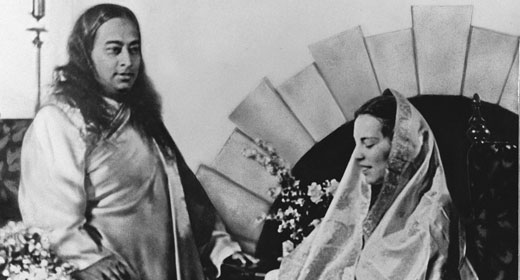by Daya Mata: Our next question is, What is Truth? First of all, let us examine what religion is, and what is the path that leads to God.

The true meaning or definition of religion can be only one: That system of behavior and application of truth by which man can remove his threefold suffering—of body, mind, and soul—by the roots, so there is no possibility of recurrence. This is what religion is—or what it is really meant to be.
Unfortunately, religion today has become to many just a system of beliefs and rituals. But these do not satisfy the soul. If they did, millions of people who go regularly to their temples, mosques, or churches would be drunk with the love of God. But this is not the case.
External worship is a good and important aspect of religion when the mind is concentrated on Him toward whom we are to direct our love and adoration; but when the ritual or ceremony becomes mechanical, and the Object of worship is forgotten, then such worship has no meaning or value. What has happened is that man has encrusted his worship of God in dogma. That is why he does not know God.
Let us go back to the question, “What is God?” God can manifest as any divine quality or in any form, but He cannot be confined to any particular concept; He is all ideas. He is within everything in this universe, and everything is contained within Him. Any thought that man has, the Divine has already thought; otherwise, man could not think it.
Down through the centuries, man has used symbols to remind him of his Creator. The earliest civilizations chose the sun, or fire, or other natural phenomena, to represent Him. These symbols became their gods. Gradually, as man’s understanding increased, religion evolved and clothed the infinite, formless Spirit with human forms and characteristics. Out of this came a whole world of division among religionists—one group saying God is this, another saying God is that, quarreling among themselves. What nonsense! The Lord can assume any aspect, or remain as unmanifested Spirit.
In seeking God, the devotee sometimes finds it much easier if he chooses some divine form as a visible symbol of the Infinite. Because through many, many incarnations man has become used to form, it is simpler for him to think of God in this way. For him who thinks it necessary, form is necessary; for him who thinks it unnecessary, it is unnecessary. But to have quarrels and divisions over which principle is right is foolishness; for the Divine is formless and with form, impersonal and personal.
I know that my Divine Beloved is essentially without form. But that does not make Him any less real. Love has no form, wisdom has no form, joy has no form; yet we experience them, don’t we? They are more real to us than form. Well, that is what God is. In the ultimate sense. He is infinite love, wisdom, joy. Nevertheless, some devotees find it helpful and spiritually captivating to think of Him in one of His divine forms, such as incarnate in Lord Krishna, Jesus Christ, Buddha; or as the Heavenly Father, Mother, Friend, or Beloved.
In the Divine the devotee can experience all the various forms of love in their purest and highest state. No love is possible except that which is channeled from the one Cosmic Source. It is God alone who is pouring through human hearts the love of mother for child, of child for parent, of lover for beloved. Though we may taint it with human impurities, all these expressions are God’s love.
Gurudeva often said: “In the pages of history how many there are who have vowed eternal love to one another! The path of incarnations is strewn with their skulls. Where is their love today?” But those souls that have been drunk with the love of God, their love lives on.
They have changed mankind, because they first transformed themselves by attunement with God’s eternal love.
How tragic it is when man renounces God! I am no renunciant. Those who reject God are the renunciants, because they have forsaken Him who is the Giver of everything in this universe. He is the sustainer of life. So often we say to Him, “My Lord, I have my children to raise, I have my work to do, I have all these things to look after—how can I find time for You?” But suppose He replied to us, “My child, I am so busy with My responsibilities, running all these universes upon universes, I haven’t time to think of you.” What then? We would cease to exist.
He knows even the tiniest grain of sand, because He is omniscient, because He is omnipresent, because everything in creation is He. Naught exists but Him. Man was born to reclaim his lost divine heritage, to know that he is one with God.
Man is a threefold being: body, mind and soul. He has a body, which he wears for a few years, like a coat. When it becomes frayed, he has it mended for as long as he can. Many organs can now be replaced for a certain period of time; but sooner or later, the body has to be cast aside. Man has a mind, but he is not this moody, narrow mind that so often is filled with prejudice, hatred, anger, jealousy, and greed. Man is the soul. How foolish he is to devote nearly all of his life, his attention, his energies, to this flesh. Perhaps a few try to improve the mind by reading good books. But who thinks of his Self—the soul?
Down through the ages God has sent divine messengers who try to rouse humanity out of its dream of delusion. They are voices crying in the wilderness “Wake, my child! Wake, my child!” If we do not respond to them, then we must endure the great awakener that cannot be ignored — suffering. Why wait for that? It shakes everyone who sleeps in delusion. At a time of great crisis, even the atheist will automatically cry out, “Oh my God!” Isn’t it so? He turns naturally to God because his soul knows there is one Power, and inwardly man is always being directed toward It.
It is often said that suffering is the greatest teacher. It is — provided we take it with right attitude. No one escapes suffering in this world unless and until he has arrived at that state wherein he beholds, not duality, but only the One, the one beam of Light pouring through all bulbs of human flesh. Then he transcends delusion; he transcends suffering. But until then, the big and the little earthquakes of sorrow and pain will continue to shake him. Such is the fate of everyone who has not heeded the voices of the divine messengers. It is never too late to seek the Divine Beloved; but what a tragedy to wait until the body is falling apart, and distracts one’s attention from thinking deeply of Him. That is why the great ones urge us:
The Divine Beloved has no favorites. The Mother loves all Her children equally, just as thesunlight falls equally on the diamond and the charcoal lying side by side. The diamond reflects the light, but the charcoal cannot. My Beloved’s grace, love, blessings, wisdom, and joy shine equally upon all Her children. The diamond mentalities reflect Her light; the charcoal mentalities have yet to be refined. That is all.
May each one of you make the effort to receive the light of God that graces your life with divine peace, love, and joy.








































